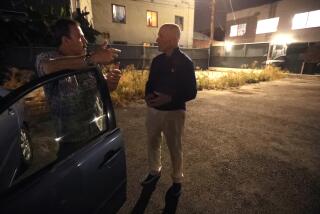The Bill of Rights : An Orphan Document : A Legal Fix for Private Failure
- Share via
SAN FRANCISCO — Two hundred years after the adoption of the Bill of Rights, I dare you to read it.
Today, Americans line up in Washington to appeal and demand and lobby for what we call our “rights.” We make the public realm the arbiter of our private lives. We want judges to authorize our sexual identities. We expect government to define the proper relationship of parents to children. We elect politicians to condone the behavior of our bodies and thus of our souls.
Read the Bill of Rights.
You do not have to be a constitutional expert to be struck by its elegant irony. Here is the voice of a government limiting the role of government in our lives, (“Congress shall make no law . . .”). The Bill of Rights is nothing but an itemization of what government cannot do to us.
Throughout, the document is a skepticism toward government reflecting our nation’s original Protestant character, a low-church fear of the group and faith in the individual. But the intellectual genealogy of the Bill of Rights is as old as the Greeks.
There is an industry in this country, I call it the Rights Industry. Its aim is to translate our private life into the public arena. Its ascendance during the last 30 years has roughly paralleled the breakdown of our private lives. The origin of this breakdown, however, may be older and harder to date. Possibly what young Americans in the notorious ‘60s sensed in their parents were old disbeliefs and thus the “hypocrisy” of parents yielding to a way of life they no longer believed in.
Coincident with this private crisis in America was the example of the black civil-rights movement--its challenge to the old order, its rightful appeals for government protection--that many Americans mistook for the romance of victimization.
Two hundred years after its adoption, I write in praise of the Bill of Rights, and yet I tell you it gave us nothing. The Bill of Rights didn’t give you or me a single right. The Bill of Rights only acknowledged our right as individuals. I regard this distinction as crucial and important to note on this anniversary, because our inclination now is exactly the reverse. We have come to see government as a giver of rights, the dispenser of largess.
Fifteen years before the Bill of Rights became part of our Constitution, Thomas Jefferson wrote in the Declaration of Independence of what he called “certain unalienable rights.” Implicit in that phrase is the idea that, as human beings, we have stature above human law. From whence comes our stature? It is not given by government. Rather, it is God-given.
I like what a friend of mine who is gay said recently: “I don’t want the justices of the Supreme Court deciding whether or not I am entitled to sleep with my lover.”
Political activists would answer, doubtlessly, that unless the government protects your rights, you have no rights. Outside the district of rhetoric, everyone knows that rights are alienable, after all. That’s what history tells us.
The activists are right, but I do not think they are more than half right, and the half that is missing has precisely to do with the private realm, to which government should have no access.
The elderly gay couple--two bachelor-uncles (everyone knew they were gay)--used to go to their Episcopal church every Sunday morning. Probably everyone made fun of them. But I’d wager the bachelors taught people around them more about the normalcy of homosexuality than any government opinion about gay life. The fact is that attitudes toward homosexuality cannot be changed by government decree alone. If attitudes are changing today, and I think they are, it is also because one’s sister is gay, or the nice man who lives in the next apartment is gay, or the old couple in the front pew at the Episcopal church is gay.
I am speaking here of intimacy, of the slow, steady influence of lives on one another, of the intimacy of daily contact. I am not speaking of the quick fix of government.
Or consider the recent debacle of the Clarence Thomas confirmation hearings. A woman I know who would want herself identified as a “feminist” tells me at issue was not the guilt or innocence of Thomas. “I don’t give a damn about Clarence Thomas. We all know that men are constantly mistreating women.”
For this woman, and in the name of the women’s movement, the individual’s right to what the Bill of Rights calls “due process” is dispensable.
Call it a civic crisis. Something has happened in America in recent decades that we scarcely know how to describe. We have lost the knack, the genius, the ease of living in the intimate realm. We find relief from this failure in abstract identities made legitimate by the public realm.
We rush to form our alliances. Women. Gays. Latinos. The elderly. The handicapped. (Who can blame white males for feeling besieged?) God help you if you do not have a group. God help you, too, if your group cannot bleat convincingly of its victimization.
Victimization has become the achievement of our public identity. Proof of victimization has become the threshold of one’s entitlement to civil rights, which means, by extension, that one is only entitled to civil rights if one is a victim.
The Bill of Rights is written otherwise. The Bill of Rights would tell Americans that the government is not a repository of morality. The individual is trusted as the moral center of the nation.
Implicit in this notion of the individual is the assumption of responsibility. Because human beings have rights, they have responsibilities. But do we believe that any more?
In the abortion debate, for example, why is it that the only question we argue is the right to an abortion? There is another question. What is the human responsibility to the unborn? If a woman has the right to her own body--and I think she does--then what is the consequent responsibility of that right?
The other day, I got into an argument with a friend of mine who is infected with the AIDS virus but feels no responsibility to inform his sexual partners. When I challenged him, he accused me of “blaming the victim.”
I am not the first to observe that Americans now seem unwilling to accept responsibility for their own actions. Easier to claim one’s rights. The state owes my kids a day-care center. The brat with long hair is suing his grammar school for the right to wear his hair long. You are entitled to a smoke-free working environment. . . . But the dance of lawyers in Washington cannot fill the vacancy in our lives.
The other day on television I saw someone (hidden behind a mask) identified as an “animal-rights activist.” I wondered: What are animal rights? In my religion, animals do not have rights, as such, but humans have the responsibility to treat God’s creation with respect.
Perhaps here is the problem. When we used to describe ourselves as having souls--some spirit in us that was unique and inviolable--then we used to have private lives. Perhaps, now, you and I do not agree any more about what it means to be human. Perhaps we have lost a spiritual commons that the framers of the Bill of Rights assumed.
Without a sense of soul, we are unable to speak--truly to speak--to one another. We make premarital contracts. We negotiate our relationships. We sue one another. In the absence of a shared morality, we have only courts of law. We demand rights of a government whose Founding Fathers knew that rights could never be given by the government.
More to Read
Sign up for Essential California
The most important California stories and recommendations in your inbox every morning.
You may occasionally receive promotional content from the Los Angeles Times.













